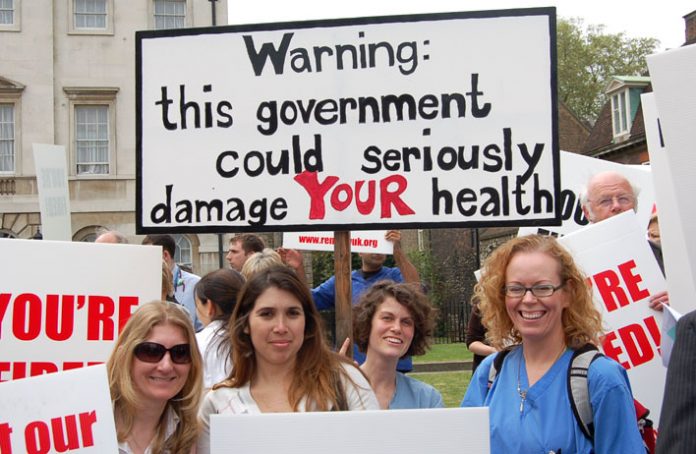Junior doctors are meeting today to discuss what to do about the government’s disastrous ‘reforms’ to post graduate medical training.
The British Medical Association Junior Doctors Committee Conference comes just days after the personal details of thousands of junior doctors from the online Medical Training Application Service (MTAS) website were let out onto the internet on Wednesday.
Junior doctor Matt Jameson Evans told News Line on Thursday: ‘For months now (rank and file organisation) Remedy UK has been asking for accountability over this process.
‘This is just another chapter in a whole litany of disasters from beginning to end.
‘All we have in return is a single apology from Patricia Hewitt in parliament last week, and a review for the future which has no bearing on the misery of the present.
‘Following on from this she walked out half way through a key debate on this issue on Tuesday in the (House of) Commons and has been unavailable for comment for months now in the media.
‘We now have 7,000 doctors’ personal details floating around on the internet freely available for data thieves.
‘We need a minister to step up and take some responsibility for this shambolic implementation which has caused so much distress to so many individuals.
‘A dignified resignation might just restore some sort of credibility to a process which has lost any confidence of the profession.’
Hewitt later on Thursday announced a review of Modernising Medical Careers and MTAS.
The one-day BMA Junior Doctors Conference is titled ‘Our Training, Our Future, Our Say’ and takes place at the London Marriott Hotel Regents Park, London, NW3.
The BMA says: ‘The agenda for this year’s annual conference of junior doctors reflects anxiety and anger at the government’s “shambolic and deeply destructive” handling of training reforms.’
Motions to be debated include:
Modernising Medical Careers (training reforms)
A call for the National Audit Office to review whether Modernising Medical Careers has wasted public money.
A vote of no confidence in the government team implementing the ‘shambolic and deeply destructive’ changes, which are also accused of impairing ‘patient safety and the quality of future consultants and GPs’.
A tongue-in-cheek call for Health Secretary Patricia Hewitt to resign and re-apply for her job through the same online system as junior doctors.
This would mean, according to the motion, that none of her experience would count, scoring would be arbitrary, and the website would fail at the crucial moment.
NHS
A call for the restoration of funding to allow junior doctors to attend essential training courses.
Warnings that private treatment centres are destabilising the NHS and represent a ‘major threat to medical training’.
A call for action to protect the safety of doctors travelling home after night shifts.
Criticism of the government for declaring that the NHS is no longer in deficit when it owes millions of pounds to companies under the Private Finance Initiative.
Criticism of managers’ obsession with the four hour A & E waiting time target, which ‘often forces rash clinical decisions’.
A call for a maximum quota of patients for whom a junior doctor is responsible.
l On Thursday, the British Medical Association (BMA) expressed concern over remarks by NHS chief executive David Nicholson who suggested more ‘reconfiguration’ for eighteen NHS trusts in the face of deficits along the lines of the takeover of the Good Hope NHS hospital by the Heart of England Foundation Trust.
A BMA spokesperson said: ‘The BMA would be very concerned if reconfiguration took place because of financial reasons and not because of clinical need and patient benefit.
‘It is very worrying that NHS debt, bankrupt hospitals and reconfiguration are all being grouped together in the discussion about these cash-strapped hospitals.
‘While the BMA recognises that the NHS needs to continue to evolve and improve, and that this will involve some reconfiguration of services, we oppose all reconfiguration based on anything other than clinical grounds.’
NHS Chief Executive, David Nicholson, said: ‘The NHS overall has responded remarkably this year to our demand to put proper rigour into the overall financial management of the NHS and create a fair and transparent system of accounting and reporting.
‘The overwhelming majority of trusts have seen improvements in their financial performance this year and there are many trusts that have really turned things around.
‘As part of this new regime we have considered the cash needs of each trust in the country, and replaced the old cash brokerage arrangements – where money was moved around the system in an unfair way and trusts who had underspent often had to bail out overspending trusts – with a new, transparent and responsible repayable loans system.
‘There are however, currently 18 NHS trusts remaining where either we could not give them a loan because they could not afford to meet the repayments, or where we agreed a loan but the amount is such that it can only be repaid over a very extended timescale.
‘This has nothing to do with the introduction of Payment by Results.
‘Strategic Health Authorities are now working through a review process with these trusts to identify long-term solutions in these areas.
‘Given the different nature of the problems in each NHS trust we expect the solution for each organisation to be individual and tailored to best deliver value for money, whilst maintaining standards of patient care to the community they serve.
‘I have no doubt that this will be a difficult and sometimes uncomfortable process for those trusts who are undergoing this process, but our absolute priority is continuity of patient care and to ensure that we have to tackle the underlying problems in these trusts no matter how uncomfortable that may be.’
